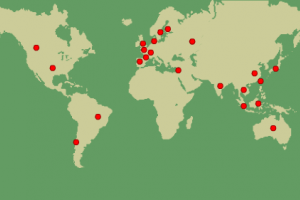Only available in Portuguese.
Large-Scale Tree Plantations
Industrial tree plantations are large-scale, intensively managed, even-aged monocultures, involving vast areas of fertile land under the control of plantation companies. Management of plantations involves the use of huge amounts of water as well as agrochemicals—which harm humans, and plants and animals in the plantations and surrounding areas.
Bulletin articles
30 December 2009
Colombia: oil-palm plantations, violation of human rights and Afro-descendent communities’ quest for true dignity
When you talk about the violation of human rights, you must talk about Colombia. When you talk about the huge expansion of oil-palm plantations, you must talk about Colombia. Both issues go hand in hand in that country
Bulletin articles
30 December 2009
The Italian oil company Eni is one of the top ten energy companies in the world and now the biggest in Africa. The company is also currently ranked as the world’s most “sustainable” oil and gas company. In September, at the UN Leadership Forum on Climate Change in New York, the head of Eni, Paolo Scaroni announced: “Gone are the days when we could afford to think about oil as a cheap input to economic and social growth, discounting the impact on the environment and on generations to come” .
Bulletin articles
30 December 2009
Before the plantations came, villagers in Teluk Kabung in Riau province in Sumatra, grew coconuts. A few years ago, thousands of hectares of forest surrounding the village were clearcut and replaced by acacia monocultures to supply Asia Pulp and Paper's massive operations. “As soon as they cut down the trees in the forest, the pests swarmed in, and ate our coconut trees,” a villager told Mitra Taj, a radio journalist from Living on Earth. Dozens of dead coconut trees lie on the ground near the village.
Other information
17 December 2009
By Global Justice Ecology Project
Other information
29 November 2009
There is nothing like creating a problem for finding a good business opportunity . Or at least this is so for seasoned business men and women. It is thus that behind wars one can easily find the arms business. Behind citizen insecurity -largely resulting from social and economic inequity- is the business of security: insurance monitoring systems, bars, alarms and heavy-handed “saviour” politicians. Behind disease is the “health” business: the drug industry and corporate medical power.
17 November 2009
Where? Which trees? What for? By who? Who support? Who regulates? Who oppose?
Research on genetically engineered trees is being currently carried out in a number of countries and yours can be one of them!
Bulletin articles
30 October 2009
The World Forestry Congress taking place in Buenos Aires is viewed as an excellent business opportunity by the Argentine forestry sector.
Other information
30 October 2009
Something extremely interesting is currently happening in Kenya. On the one hand, the country’s Environment Minister, John Michuki, has ordered the uprooting of eucalyptus trees from wetlands and banned their planting along rivers and watersheds.
Bulletin articles
30 October 2009
Uruguay and the Republic of Korea have recently signed an Agreement for Investment Promotion and Protection which, according to Uruguayan government authorities establishes a framework for Korean investment in Uruguay. From past experience in Uruguay, the establishment of a framework for investment in this country may mean reducing or eliminating all taxation, granting of foreign trade zone permits and all kinds of support to the company’s enterprises.
Bulletin articles
30 October 2009
World demand for paper and paperboard is expected to grow by 2% to 3% annually in the long term, with significant growth potential for Asia and Eastern Europe - India, China and Russia in particular. Paper pulp exports from Latin America from lands converted into monoculture tree plantations, so called “green deserts”, are expected to grow by 70% between 2000 and 2010.
Bulletin articles
30 September 2009
International Day against Monoculture Tree Plantations is a good opportunity to expose the myths being spread around about the so-called “benefits” of these plantations. Such myths have not arisen on their own but are the result of a long process during which people and institutions related to the corporate-plantation sector have invented arguments to convince both the general public and governments and institutions of the advisability of mass tree plantation.


